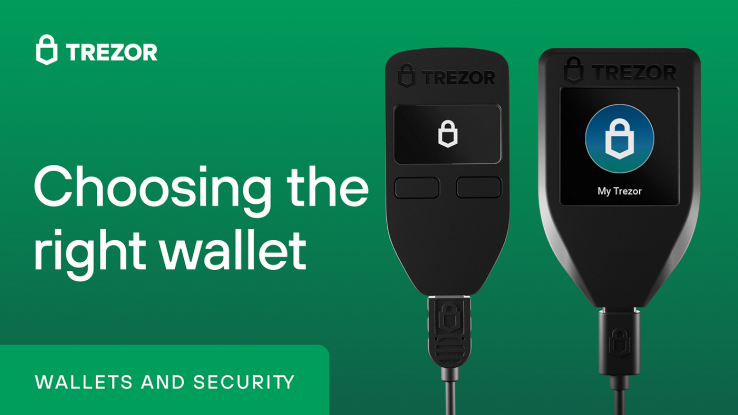Table of Contents
- What Is a Crypto Wallet? 👛
- How Does a Crypto Wallet Work? ⚙️
- What Is a Crypto Wallet Address? 📧
- What Is a Private Key? 🔑
- Types of Crypto Wallets Explained 🛠️
- Why You Shouldn’t Store Crypto on Exchanges 🚨
- What Are the Best Crypto Wallets? 🌟
- Are Ledger and Trezor Safe? 🛡️
- What Is the Safest Crypto Wallet? 🏆
- FAQs on Crypto Wallets Explained ❓
What Is a Crypto Wallet? 👛
Need to have crypto wallets explained? Think of them as your gateway to the world of digital assets. Consider a crypto wallet as a digital safe, that securely stores the private keys needed to access and manage your cryptocurrencies.
Without a wallet, you can’t send, receive, or truly own digital assets. While crypto itself isn’t physically stored in the wallet, it acts as a bridge, proving ownership of the assets on the blockchain.
How Does a Crypto Wallet Work? ⚙️
When you own cryptocurrency, what you really hold is access to a specific address on the blockchain. A crypto wallet interacts with this blockchain, allowing you to send and receive funds. It consists of two critical components:
- Private Key: Like a PIN for your bank account—this must remain secret.
- Public Address: The “receiving” address you share with others, similar to a bank account number.
When you send crypto, your wallet uses the private key to digitally sign the transaction, proving ownership. This process ensures only the rightful owner can move the funds.
Advertisement
Join Gemini today and get $15 in free Bitcoin when you trade with an easy, secure and U.S.-regulated crypto exchange you can trust. Offer valid for U.S. residents only; crypto investments are risky.
What Is a Crypto Wallet Address? 📧
Your crypto wallet address is a unique string of letters and numbers—kind of like a digital mailing address. It’s what you share with others to receive payments. For example, a Bitcoin address might look like:
1A1zP1eP5QGefi2DMPTfTL5SLmv7DivfNa
Each wallet generates a different address for every supported cryptocurrency, so don’t try sending Bitcoin to an Ethereum address—it won’t end well!
What Is a Private Key? 🔑
A private key is the crown jewel of your crypto wallet. It’s a long, randomly generated code that gives you control over your funds. If your wallet were a lock, the private key would be the key that opens it. Here’s the catch: never share it with anyone. Losing or exposing your private key can lead to permanent loss of funds.
Types of Crypto Wallets Explained 🛠️
Choosing the right wallet depends on your needs and preferences. Let’s break down the most popular types:
Hardware Wallets
These are physical devices designed to store your private keys offline. Brands like Ledger and Trezor dominate this category. They’re considered one of the safest options because they’re immune to online hacks.
Pros: Extremely secure, great for long-term storage.
Cons: Costly and not ideal for frequent transactions.
Hot Wallets
Hot wallets are software-based and connected to the internet, making them convenient for daily use. Examples include MetaMask and Trust Wallet.
Pros: User-friendly, perfect for frequent trading.
Cons: Vulnerable to hacking due to online exposure.
Cold Wallets
Cold wallets are entirely offline. This category includes hardware wallets and even paper wallets.
Pros: Ultimate security against online threats.
Cons: Less convenient for quick transactions.
Mobile Wallets
Mobile wallets, like Exodus or Mycelium, are apps that let you manage crypto on the go.
Pros: Convenient and portable.
Cons: Limited security compared to hardware wallets.
Exchange Wallets
These are wallets provided by crypto exchanges like Binance or Coinbase. They’re easy to use but should only be used temporarily.
Pros: Convenient for beginners.
Cons: Exchanges control your private keys, putting your funds at risk.
Why You Shouldn’t Store Crypto on Exchanges 🚨
If you’re tempted to leave your funds on an exchange, think again. Exchanges are prime targets for hackers, and history is littered with infamous breaches (hello, Mt. Gox). Moreover, exchanges hold your private keys, meaning you don’t truly own your crypto. Remember the golden rule: “Not your keys, not your crypto.”
What Are the Best Crypto Wallets? 🌟
Some top picks for 2024 include:
- Ledger Nano X: A robust hardware wallet with Bluetooth compatibility.
- Trezor Model T: Known for its intuitive touchscreen and strong security.
- MetaMask: A popular hot wallet for Ethereum users.
- Exodus: A sleek, multi-currency mobile wallet.
Each of these wallets has its strengths, so pick one that aligns with your needs.
Are Ledger and Trezor Safe? 🛡️
Yes, both Ledger and Trezor wallets are among the safest options on the market. They’ve built their reputations on security and innovation. Ledger uses a secure chip, while Trezor operates on open-source software for transparency. However, always buy these wallets directly from the manufacturer to avoid tampered devices.
What Is the Safest Crypto Wallet? 🏆
The safest wallet ultimately depends on how you use it. For maximum security, combine a hardware wallet (like Ledger or Trezor) with a secure backup of your private keys. If you’re managing large amounts of crypto, consider spreading your assets across multiple wallets.
FAQs on Crypto Wallets Explained ❓
Q: Can I use one wallet for all cryptocurrencies?
A: Some wallets, like Ledger and Exodus, support multiple coins, but others may only handle specific ones.
Q: What happens if I lose my wallet?
A: As long as you have your recovery phrase (seed phrase), you can restore your funds on a new device.
Q: Are free wallets safe?
A: Free wallets like Trust Wallet or MetaMask can be secure for small amounts, but hardware wallets are safer for significant holdings.
And there you have it—your ultimate guide to crypto wallets! Whether you’re a seasoned trader or a curious newcomer, securing your crypto with the right wallet is the first step toward financial freedom. Keep your keys safe, and happy HODLing! 🚀








